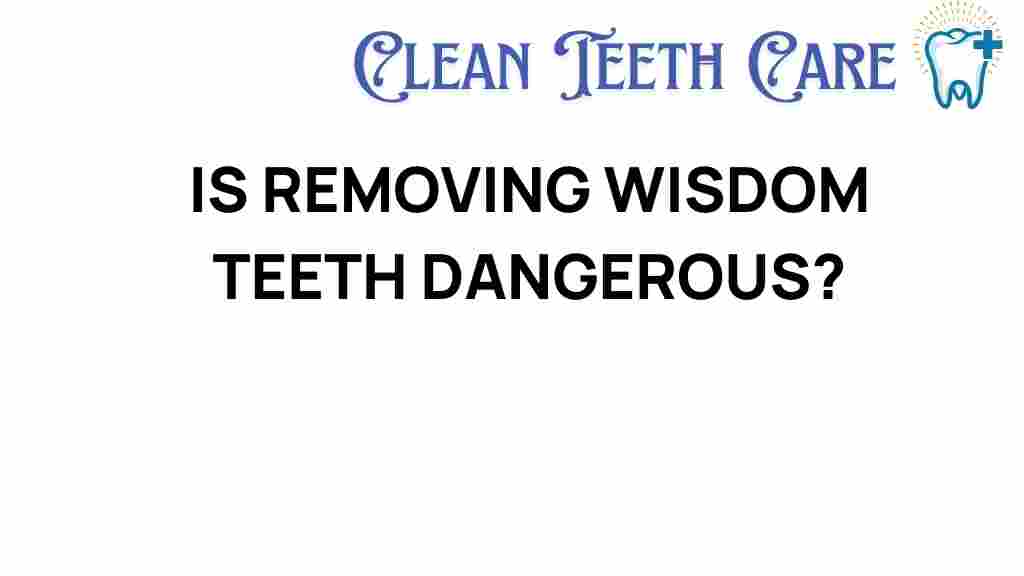Is Removing Wisdom Teeth a Risky Move for Your Health?
Wisdom teeth, also known as third molars, often emerge during late adolescence or early adulthood. For many, this can lead to a common dental dilemma: should they be removed? While some individuals experience no issues with their wisdom teeth, others may face complications that necessitate dental surgery. In this article, we will explore the various aspects of wisdom teeth removal, including potential health risks, recovery expectations, and the importance of preventive care.
Understanding Wisdom Teeth
Wisdom teeth typically begin to erupt between the ages of 17 and 25. They can be beneficial if they emerge correctly and align with existing teeth. However, many people experience complications due to a lack of space in the jaw, leading to issues such as:
- Impaction: When a tooth is unable to fully emerge through the gums.
- Crowding: When wisdom teeth push against adjacent teeth.
- Infection: Partially erupted wisdom teeth can trap food and bacteria.
- Cysts or tumors: These can develop around impacted teeth.
Given these potential complications, many dentists recommend removal as a preventive measure. However, the decision should be based on individual circumstances and dentist advice.
When to Consider Wisdom Teeth Removal
Not all wisdom teeth require removal. Here are some scenarios where extraction may be advised:
- If the teeth are impacted and causing pain.
- If there is a risk of infection or periodontal disease.
- If crowding is affecting the alignment of other teeth.
- If cysts or tumors are detected in dental imaging.
Consulting with a qualified dentist can help in making an informed decision based on your specific oral health needs.
The Dental Surgery Process
Once the decision is made to remove wisdom teeth, understanding the dental surgery process can help alleviate fears. Here’s a step-by-step breakdown:
1. Pre-Surgery Consultation
Your dentist will conduct a thorough examination, possibly including X-rays, to assess the position of your wisdom teeth. This is also an opportunity to discuss:
- Your medical history
- Any medications you’re taking
- Possible sedation options
2. Anesthesia Options
During the surgery, dentists may use local anesthesia, sedation, or general anesthesia, depending on the complexity of the extraction and patient preference.
3. The Extraction Procedure
The procedure generally involves:
- Making an incision in the gum tissue to expose the tooth and bone.
- Removing any bone blocking access to the tooth.
- Extracting the tooth, often in pieces if it is impacted.
- Stitching the incision site closed, if necessary.
4. Post-Surgery Care
After the extraction, the dentist will provide guidelines for recovery:
- Resting and avoiding strenuous activities for a few days.
- Managing pain with prescribed medications or over-the-counter pain relievers.
- Applying ice packs to reduce swelling.
- Eating soft foods and maintaining hydration.
- Following up with the dentist for any concerns.
Potential Complications of Wisdom Teeth Removal
While wisdom teeth removal is common and generally safe, complications can arise. Understanding these risks is crucial for patient safety:
- Dry Socket: This occurs when the blood clot at the extraction site dislodges, leading to pain and delayed healing.
- Infection: Signs include fever, swelling, and pus discharge.
- Nerve Damage: Although rare, damage to nearby nerves can cause numbness or tingling.
- Excessive Bleeding: While some bleeding is normal, persistent bleeding should be reported to your dentist.
To minimize these risks, it’s essential to follow your dentist’s post-operative instructions closely.
Recovery Expectations
The recovery period after wisdom teeth removal varies from person to person. Here’s what you can generally expect:
- First 24 Hours: Rest is crucial. Ice packs can help reduce swelling.
- 3-5 Days Post-Surgery: Pain and swelling should gradually decrease. Soft foods should be introduced.
- One Week Post-Surgery: Most individuals can return to normal activities, but full healing may take a few weeks.
It’s important to stay hydrated and maintain good oral hygiene by gently rinsing your mouth with salt water after the first 24 hours.
Preventive Care After Wisdom Teeth Removal
Maintaining oral health post-surgery is vital to prevent further complications. Here are some tips for preventive care:
- Continue regular dental check-ups to monitor your oral health.
- Practice good oral hygiene: brush and floss regularly.
- Avoid smoking or using straws for at least a week post-surgery, as this can lead to dry socket.
- Eat a balanced diet rich in vitamins and minerals to promote healing.
Troubleshooting Tips
Even with careful planning and care, issues may arise during recovery. Here are some troubleshooting tips:
- If you experience severe pain: Contact your dentist immediately to rule out dry socket or infection.
- If swelling persists beyond a few days: Reach out to your dentist for advice.
- If bleeding continues: Bite down on a gauze pad for 30 minutes, and if it doesn’t stop, contact your dentist.
Always listen to your body and reach out to your dentist if something feels off. Your safety and health should be your top priority.
Conclusion
Removing wisdom teeth is a common procedure that can significantly enhance your oral health and prevent future complications. While there are risks associated with dental surgery, understanding the procedure, recovery, and potential complications can empower you to make informed decisions regarding your health.
Consulting with your dentist for personalized advice and adhering to preventive care practices after surgery will ensure the best outcomes for your oral health. Remember, your dentist is your ally in navigating these decisions, so don’t hesitate to seek their guidance.
For more information on dental health and preventive care, check out this resource. Stay proactive about your health!
If you’re considering wisdom teeth removal or have further questions, feel free to contact us for more information.
This article is in the category Treatments and created by CleanTeethCare Team
